Generation Equality Commitment Makers at CSW69
Date:
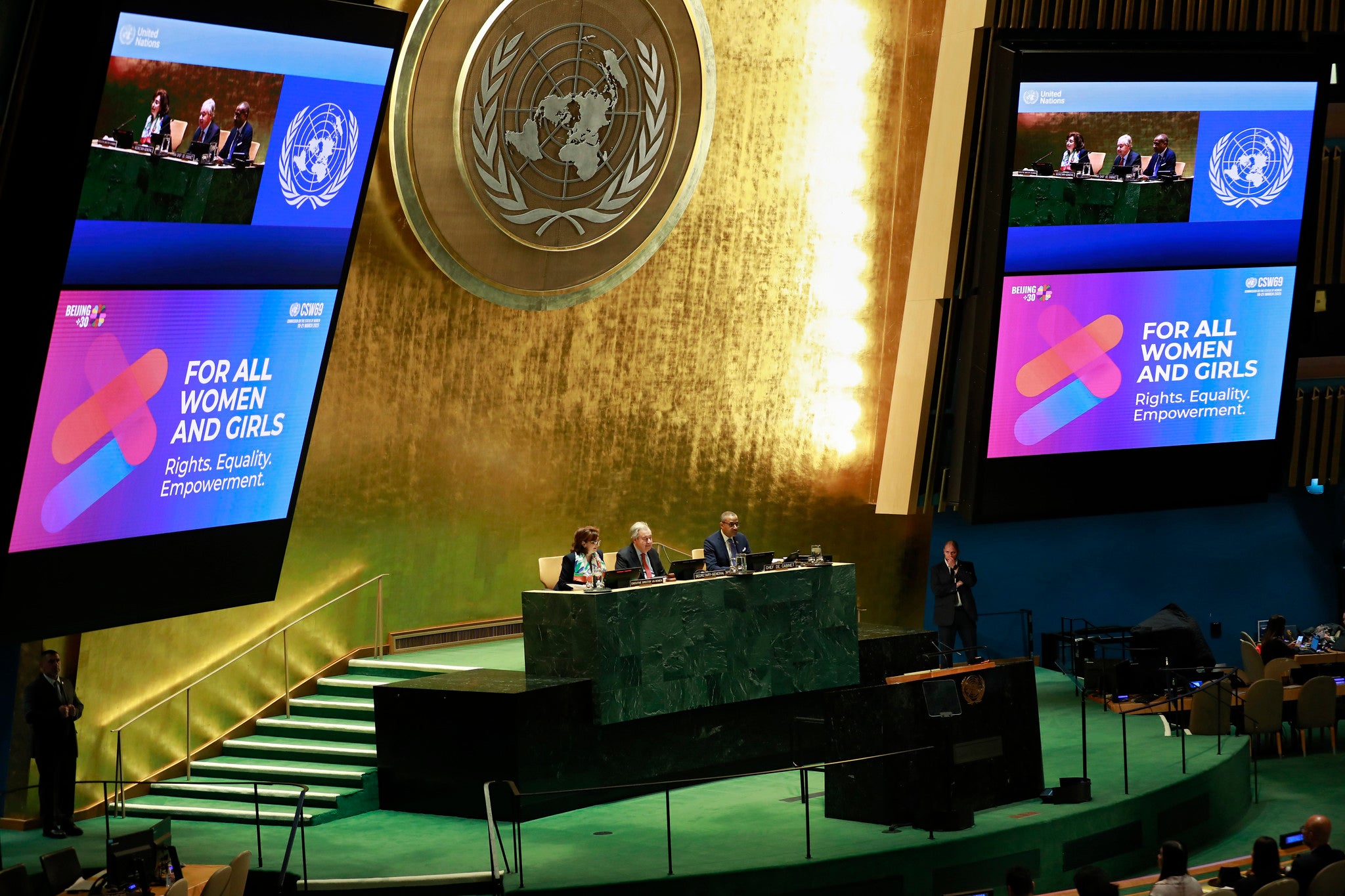
The 69th session of the Commission on the Status of Women (CSW69). Photo: UN Women/Ryan Brown
As the sixty-ninth session of the Commission on the Status of Women (CSW69) concludes at the United Nations Headquarters in New York (March 10-21, 2025), the Generation Equality initiative continues to show its key role in accelerating gender equality worldwide.
This year's CSW69 focused on reviewing and appraising the implementation of the Beijing Declaration and Platform for Action, marking 30 years since this landmark agreement. The session provided a crucial platform for Generation Equality commitment makers to showcase their progress and renew their pledges toward gender equality.
Generation Equality stakeholders hosted an event titled “Multistakeholder Partnerships: Leveraging Generation Equality to Advance Recommitment, Accountability, and Resourcing of the Beijing Platform for Action”, highlighting how Generation Equality has enabled tangible results towards the Beijing Platform for Action by spotlighting collective efforts advanced through the six Action Coalitions and the Women, Peace and Security and Humanitarian Action (WPS-HA) Compact.
Generation Equality Commitment Makers from East and Southern Africa region were actively present and contributing to the CSW69 discussions by hosting events, speaking at events and moderating sessions.
“A generation that refuses to inherit unfinished business”
Generation Equality youth activist from Kenya, the UN Women ESARO Youth Steering Committee Members and Kenyan entrepreneur and climate activist Wanjũhĩ Njoroge, represented African youth at CSW69, delivering powerful opening remarks at the CSW69, highlighting both progress and persistent challenges in advancing gender equality.
"As we mark 30 years since the Beijing Declaration, I stand before you with a profound sense of responsibility not just as a young African woman, but as part of a generation that refuses to inherit unfinished business," Wanjũhĩ stated in her address to the Commission.
She acknowledged remarkable progress, including Rwanda's world-leading female parliamentary representation at 63,8% and economic empowerment programs like Kenya's Ajira Digital initiative. However, there’s critical pushbacks that demand urgent attention.
"We are not here as guests. We are here as partners in shaping a future that is inclusive, just and equitable," she declared, calling for concrete actions including gender-transformative financing, better data collection, and institutionalized youth representation.
East and Southern Africa Commitment Makers Contribution at CSW69
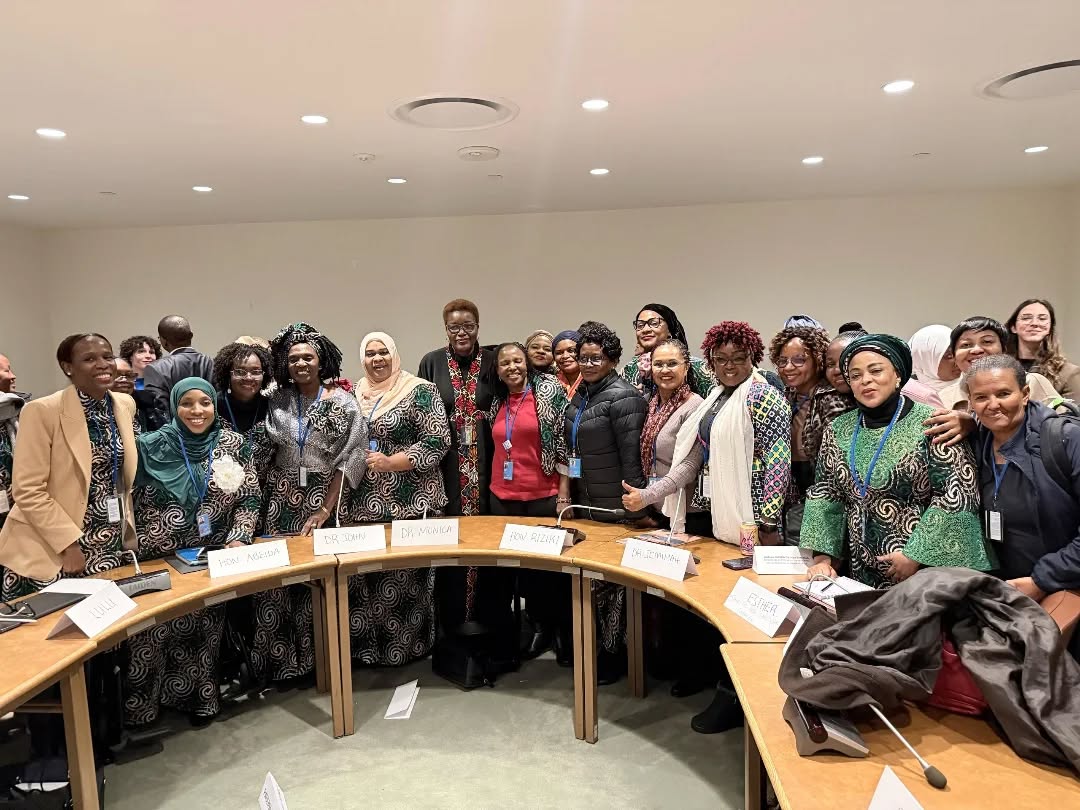
Participants at the CSW69 sessions at the UN Headquarters. Together with the Government of the United Republic of Tanzania and fellow Civil Society Organizations, Generation Equality Commitment Makers unite to amplify women’s voices. Photo: WILDAF
The Government of Tanzania and other Generation Equality Commitment Makers, such as LANDESA, GATA, WILDAF and UN Women held the event "Generation Equality Towards Beijing +30: Addressing Rural Women’s Land Tenure Insecurity and Gender Inequality.
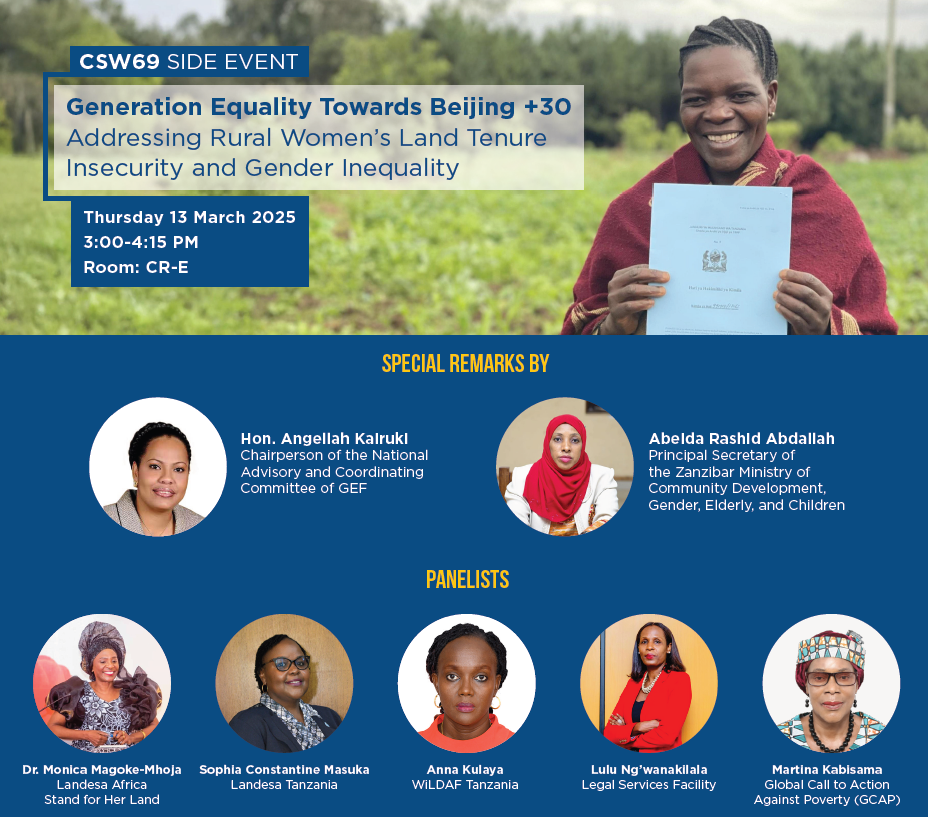
The session amplified best practices related to Beijing +30, focusing on women’s land rights, women in the mining sector, the intersection of gender-based violence (GBV) and land rights, and access to economic resources for poverty eradication and gender equality. It featured a panel of experts, including practitioners in women’s land rights, land tenure, gender equality, and women in mining. The session contributed to regional discussions, including The Africa We Want, and global conversations on women’s land rights, gender equality, and poverty eradication, aligning with Beijing +30 goals.
Nala Feminist Collective advocated for Sudanese young women’s representation in Africa-focused discussions, particularly through the North Africa Youth Beijing +30 Declaration, ensuring their inclusion in decision-making spaces on peace and security. As such, together with New York University, Nalafem organized the side-event “Young Women Mobilizing for Peace: A night of Solidarity with Sudan”, bringing together a diverse group of young feminists and women leaders from various generations and backgrounds to galvanize solidarity, ending conflict related sexual violence, calling for a ceasefire to stop the war in Sudan.
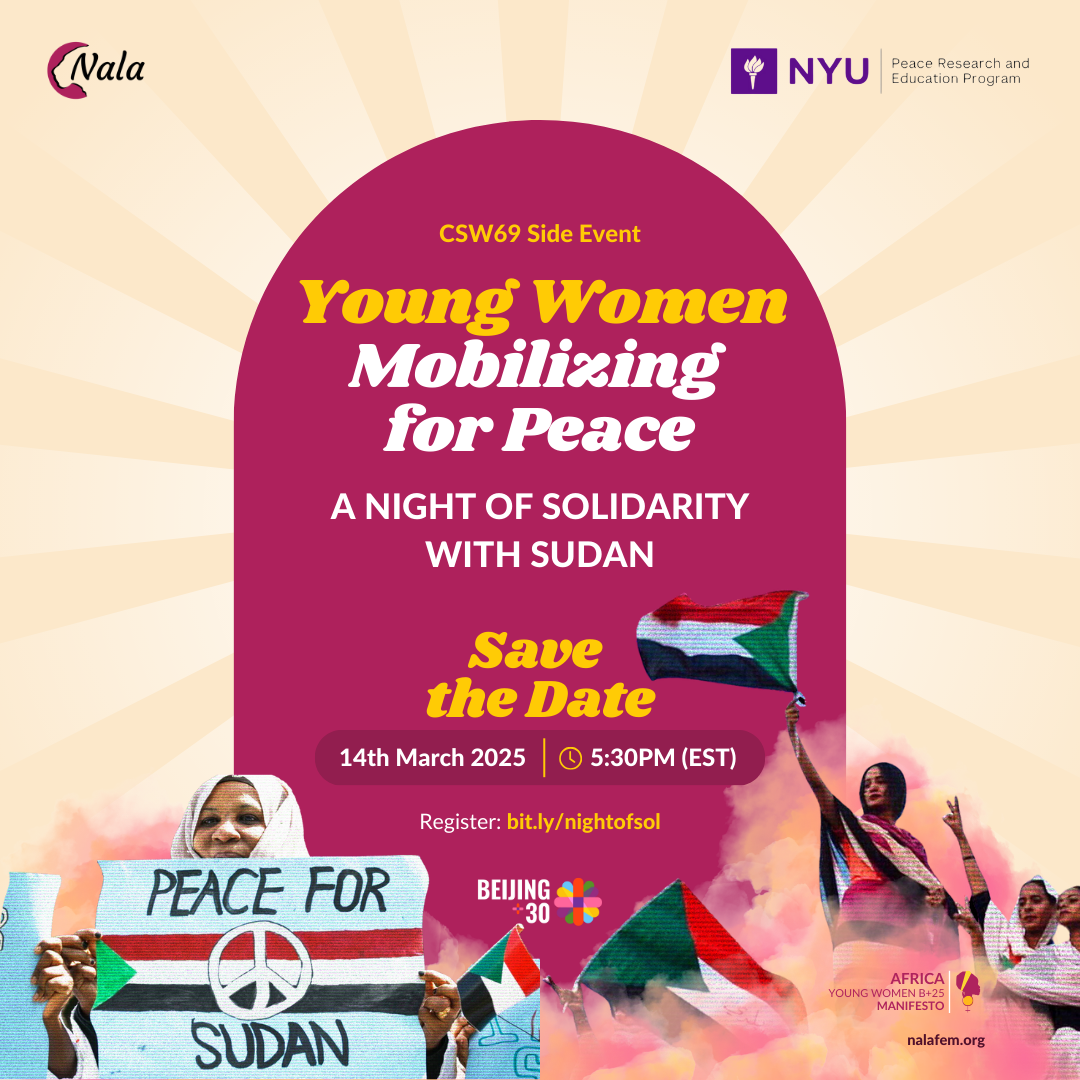
The Government of Rwanda, through the Ministry of Gender and Family Promotion (MIGEPROF) and the Permanent Mission of Rwanda to the United Nations, in partnership with UN Women and the Legal Aid Forum, hosted the side event “Equality Before the Law in Rwanda: Gains, Gaps, and Future Reforms”, focused on Rwanda’s legal progress toward gender equality. The event highlighted Rwanda’s achievements in fulfilling commitments under the Beijing Declaration and Platform for Action and emphasized the crucial role of legal frameworks in advancing gender equality, advocating for the elimination of discriminatory laws, and strengthening rights-based legal protections for women.
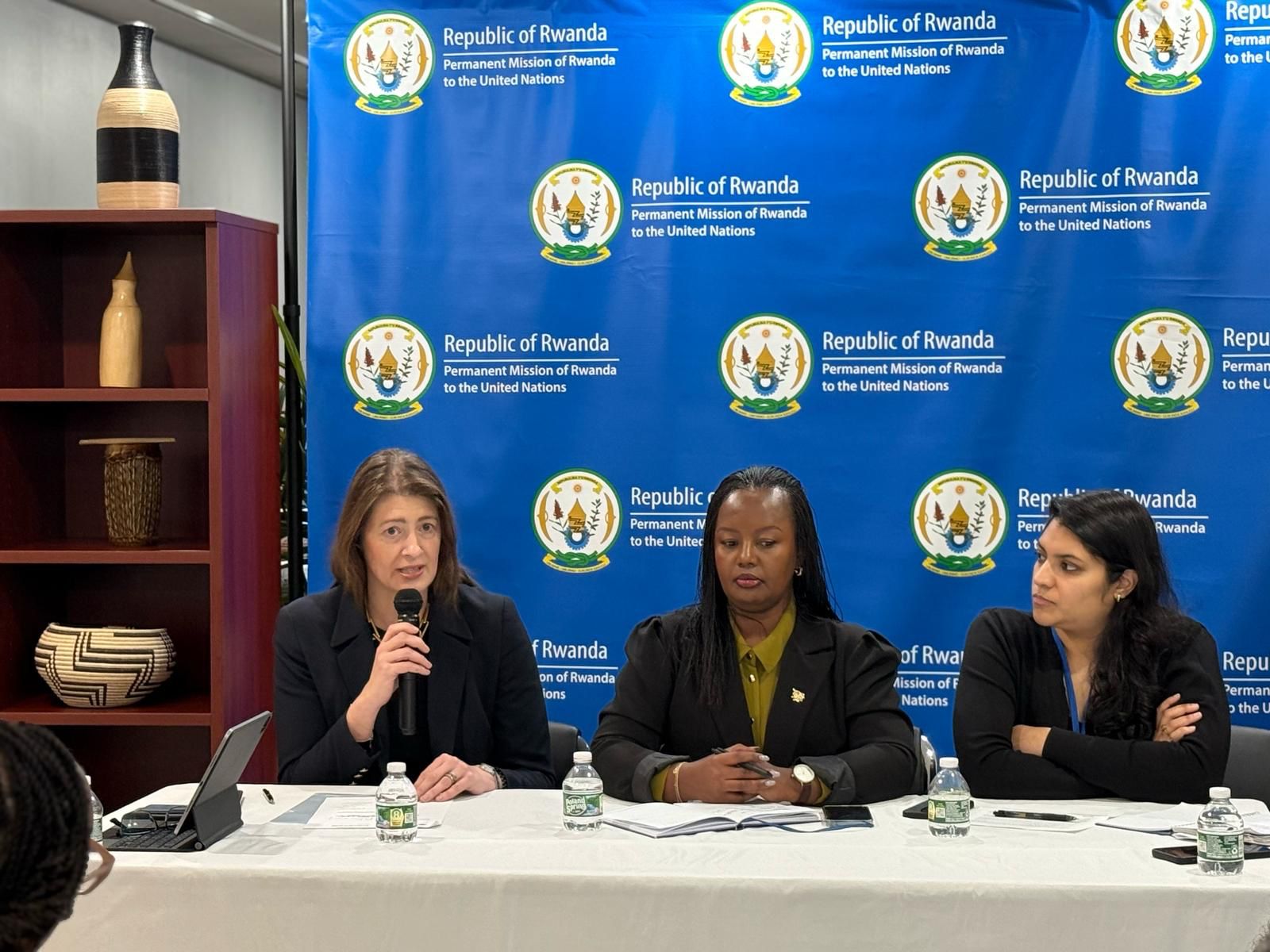
Speakers at the side event “Equality Before the Law in Rwanda: Gains, Gaps, and Future Reforms” at CSW69. Photo: Gender Monitoring Office of Rwanda
Commitment Makers FEMNET, Womankind Worldwide and Polycom, hosted the event “Feminist Movements and the Beijing Vision, 30 years later!” to reflect on the progress made 30 years after the adoption of the Beijing Declaration and Platform for Action (BDPFA). The discussion focused on violence against women, women’s participation and leadership, and women’s economic rights and justice. The event also provided key recommendations for state and non-state actors, drawing insights from partners and grantees in Afghanistan, Ethiopia, Nepal, Uganda and Zimbabwe.
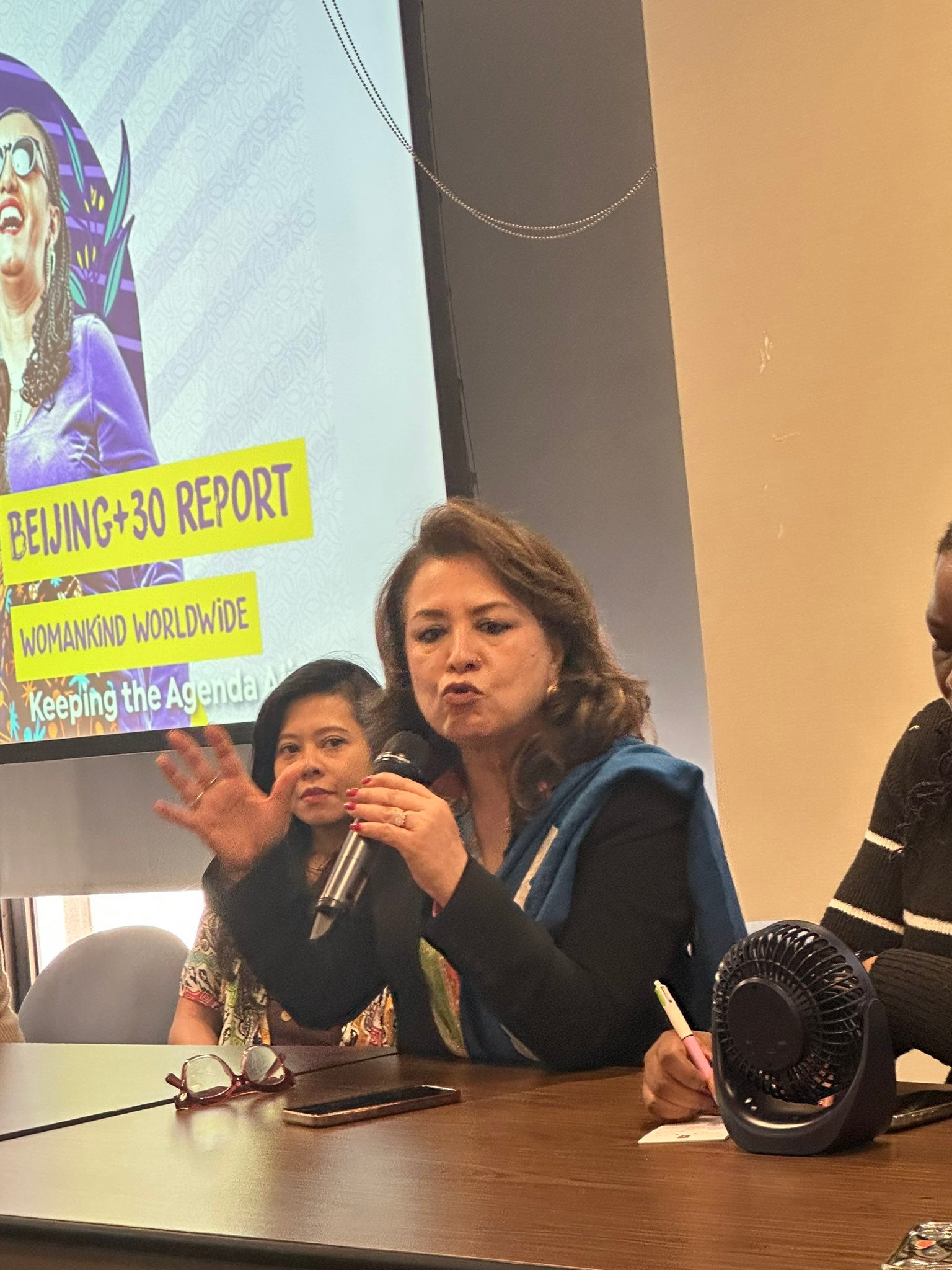
Speakers at the event “Feminist Movements and the Beijing Vision, 30 years later!” at CSW69. Photo: Womankind Worldwide
UN Women, the Government of Malawi, Generation Equality Action Coalition on Feminist Movements and partners, hosted the session “Claiming Civic Space: Advancing Intergenerational and Intersectional Feminist Movements and Leadership in a Challenging Global Context” to discuss strategies to amplify the leadership of feminist movements and foster intergenerational and intersectional solidarity. The event provided a platform for Member States to strengthen their support for feminist movements, focusing on actionable solutions to protect civic spaces, ensure the safety of human rights defenders, and foster intergenerational and intersectional feminist leadership.
The Government of Kenya, as the leader of the Action Coalition on Gender-Based Violence, hosted a side event to highlight how governments can advance gender-sensitive judicial reforms through the establishment of Specialized Courts for GBV. The event also aimed to showcase innovative mechanisms adopted to address GBV and demonstrate the importance of investing in data for GBV programming.
Commitment makers also participated in several events organized under the Action Coalition on Feminist Action for Climate Justice (FACJ), including the virtual event “Advancing Data for Synergies Between Gender, Climate, and Environment.” This session was hosted by IIED and co-sponsored by the FACJ Action Coalition, UN Women, and other partners. It was organized in collaboration with FACJ commitment makers such as GEDA (a collective commitment), WEDO, and UNFCCC, with additional support from the CBD Women’s Caucus. Speakers from the FACJ Action Coalition included representatives from GROOTS Kenya, Women for a Change Cameroon, and GEDA, while UN Women’s Research and Data Section also contributed to the discussion.
The path forward
The Generation Equality initiative, launched at the 25th anniversary of the Beijing Declaration, continues to serve as a crucial multi-stakeholder platform bringing together governments, UN agencies, civil society, youth organizations, and the private sector.
As Wanjũhĩ Njoroge emphasized in her closing remarks: "We need multi-stakeholder partnership platforms, like Generation Equality, where Member States, UN agencies, youth, civil society organizations, and the private sector can come together, collaborate, and make collective decisions. Only by acting together can we drive meaningful progress toward gender equality."
See the list of the Generation Equality events at CSW69: https://africa.unwomen.org/en/stories/news/2025/03/generation-equality-at-csw69